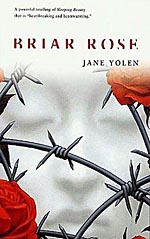
![]() bazhsw
bazhsw
7/10/2023
![]()
I feel like I have wanted to read this book for a number of years. It always crops up on those lists I peruse, mostly around something I always enjoy - the retelling of fairy tales. Briar Rose is an interpretation of Sleeping Beauty, a story that has a number of versions way before we get to the sanitised Disney version which aren't always the romantic fairy tale children know today.
The central character Becca has grown up around her grandmother Gemma telling her and her sisters her version of 'Briar Rose', a story that all the children know off by heart. As she dies she asks her granddaughter to 'find her castle', a tale which takes the American Becca to Poland in the mid-90's and to the town which was once the site of an extermination camp.
I'm not getting into spoiler territory as the blurb on the back clearly makes out that this retelling reimagines Sleeping Beauty in the context of the Holocaust. Even if one does not know that, the clues are laid bare quite early. I suppose the audience for the book is a Young Adult one so perhaps some of the signifiers are not quite so obvious to younger readers.
The book's structure is relatively basic. Becca does some basic research where all the pieces fall quickly into place following her grandmother's death which quickly takes her to Poland where her investigation is basic at best. Everything falls into her lap so to speak so there is little sense that she is 'uncovering' the truth, more that she arrives and learns the story of her grandmother. I can give the book a pass, because ultimately this is a book about telling stories but the last quarter of the book is essentially Becca being told what happened to her grandmother.
I didn't particularly like Yolen's portrayal of the Poles in the novel - it was only a few years after this novel that I was in Lodz quite close to where much of the novel was set. I got the real sense that Yolen was making the Poles out to either be a figure of fun, or unintelligent or just unpleasant. It felt like a very 'American' attitude to another culture not their own - the constant correcting of a Polish woman's English was rather grating.
An interesting plot device is when one considers Gemma. Her constant telling of 'Briar Rose' seems to be a plea for her children and grandchildren to Never Forget the Holocaust, even if Gemma cannot remember it. One is never quite sure if Gemma has amnesia regarding her life, or through the trauma she suffered chose to block out the pain and suffering. One is never quite sure what is a retelling, what is just a story and what is the truth. I think it adds to the books depth.
The scenes describing the extermination of Jews are harrowing, and they always should be. I hope there never comes a day when I read such scenes in fiction or otherwise and am not deeply moved. Indeed, I was choking back tears near the end of the book, feeling the love for another human and where in the darkest of humanity there are still slivers of light.
I believe a number of reviewers have commented on the LGBT themes - I picked this up as part of my LGBT reading challenge. If anyone's takeaway reading this is the depiction of homosexuality is unsettling or inappropriate I don't know what to say. It's a novel about love, it's a novel that describes the horror of the extermination of millions. The fact there is a gay man in there should not be giving anyone sleepless nights.
It's not a perfect book by a long stretch, but it's incredibly moving and works as a wonderful and clever retelling of a fairy tale.